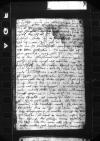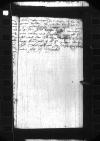Das sich E(wer) H(erlichkei)t ⌊⌋, das dÿ mir uff mein negst ⌊⌋ nicht habe geantwort / aus der ursach, / das sich E(wer) H(erlichkei)t das testaments etc. nicht annimpt, / sonder lest dÿ freuntschafft machn(n), / lasse ich wol zu. / Es hat aber E(wer) H(erlichkei)t eygen handt vor dy freuntschafft, / gleich ab sy gross recht hetten geschryben. / Der wegen het ich gern gewust, / wÿ E(wer) H(erlichkei)t das antwort, das ich dem ⌊ersamen(n)⌋ vo(n) ⌊Bremen(n)⌋ ggeben(n), gefallen etc. Es nimpt mich wunder, wy dÿ freuntschafft in den whan khompt im byschtumb zu erben, / und dy wort das testaments zuvorkheren, / und anders, dan wÿ sÿ written over w⌈wÿÿ written over w⌉ lygen und geschrÿben, zu dewthen. / Wan ich eynnem gebe, das ich ander wo habe, / so geb ich im jo nicht, das ich bey mir hab etc. Dovon yst yczt unnot wol mher antzutzeygen(n). / Ich woldt, sy dovon lyssen, / und sich selbst nicht beswer und ungelimpff thethen etc. Das E(wer) H(erlichkei)t vo(n) ⌊Marienburg⌋ schreybet, / yst wenig zu achtn. / Wan ein kindt gesmÿssen wirdt, / kan ihm das weynen(n) nicht vorbothn werd(en). / Sy sein gesmÿssen, das es in noch iren wyllen nicht ergangen etc. so wollen wir ihn das redn zu lassen, / so weit es unsern ehrn leydlich. / Khompt der gleichn was stadlichn an thag, / als dan wir alle, dy es wirdt anghen, wollen Got und unser unschult  AAWO, AB, D. 7, f. 22v zu hulffe nheme(n), / und uns byllichr weis wol wyssen dar kegn(n) zu stellen / und halthn(n) etc. Wÿl auch E(wer) H(erlichkei)t gerathn und freuntlich gebethen haben, / wolde sich solchs und anders, das E(wer) H(erlichkei)t vo(n) hove geschrybn, / nicht fast zu gemuet zÿhen. / Dÿ zeyt kan vyl ding lindern und wandlen. / Dorneben wolde wÿr eynnen den andern(n) nicht lassenn(n), / und mit E(wer) H(erlichkei)t und unser ander freuntschafft hulffe und vorstandt solchen gewytter wol wyssen vorzukhomen(n). / Ich hoffe mit Gots genade lenger uff ⌊Heylsberg⌋, do hin ich mich / mit zu lass ⌊ba(pstliche)r hey(ligkei)t⌋ noch III III wochn werde begeben(n), / dan jenner(r) uff ⌊Margenburg⌋ wirt sytzen(n), / auch fester und sicherer, / dy weil wir zu samne werden halden, / und der vornunfft[1], dy uns Got gegeben(n), gebrauchenn(n), / dorffen wir uns vor den etc. niht besorgen(n). Das mir E(wre) H(erlichkei)t schreybt vo(n) de(n) ⌊Thurkhen(n)⌋ yst, / Got erbarms und bessers, wor. Ich hab vor II stunden der halben auch schryfft gehabt, das de written over a⌈aee written over a⌉r(r) ⌊Kaltzianer⌋ mit etlich hundert pferden dovon ist khomen(n), geschutz und vil leut vorloren, und superinscribed⌈undund superinscribed⌉ das hyrumb ⌊ro(misch)e ko(niglich)e m(ajeste)t⌋ von ⌊Prage⌋ sich hin, do dy slacht vorloren, / sich eygner p(er)son begybt, und der her ⌊krakysche byschoff⌋ und ⌊posnichr woyewod⌋ dÿ botschafft dysmal berwhen lassen. / Wÿl E(wer) H(erlichkei)t gen ⌊Kraka⌋ was schreyben(n), / so vorschafft dy
AAWO, AB, D. 7, f. 22v zu hulffe nheme(n), / und uns byllichr weis wol wyssen dar kegn(n) zu stellen / und halthn(n) etc. Wÿl auch E(wer) H(erlichkei)t gerathn und freuntlich gebethen haben, / wolde sich solchs und anders, das E(wer) H(erlichkei)t vo(n) hove geschrybn, / nicht fast zu gemuet zÿhen. / Dÿ zeyt kan vyl ding lindern und wandlen. / Dorneben wolde wÿr eynnen den andern(n) nicht lassenn(n), / und mit E(wer) H(erlichkei)t und unser ander freuntschafft hulffe und vorstandt solchen gewytter wol wyssen vorzukhomen(n). / Ich hoffe mit Gots genade lenger uff ⌊Heylsberg⌋, do hin ich mich / mit zu lass ⌊ba(pstliche)r hey(ligkei)t⌋ noch III III wochn werde begeben(n), / dan jenner(r) uff ⌊Margenburg⌋ wirt sytzen(n), / auch fester und sicherer, / dy weil wir zu samne werden halden, / und der vornunfft[1], dy uns Got gegeben(n), gebrauchenn(n), / dorffen wir uns vor den etc. niht besorgen(n). Das mir E(wre) H(erlichkei)t schreybt vo(n) de(n) ⌊Thurkhen(n)⌋ yst, / Got erbarms und bessers, wor. Ich hab vor II stunden der halben auch schryfft gehabt, das de written over a⌈aee written over a⌉r(r) ⌊Kaltzianer⌋ mit etlich hundert pferden dovon ist khomen(n), geschutz und vil leut vorloren, und superinscribed⌈undund superinscribed⌉ das hyrumb ⌊ro(misch)e ko(niglich)e m(ajeste)t⌋ von ⌊Prage⌋ sich hin, do dy slacht vorloren, / sich eygner p(er)son begybt, und der her ⌊krakysche byschoff⌋ und ⌊posnichr woyewod⌋ dÿ botschafft dysmal berwhen lassen. / Wÿl E(wer) H(erlichkei)t gen ⌊Kraka⌋ was schreyben(n), / so vorschafft dy  AAWO, AB, D. 7, f.23r {dy} brive uber morgen(n) her, / do hin ich ⌊Bernt⌋, meynnen bruder, / der mit der bir zceysse E(wer) H(erlichkei)t gern dynen(n) wyl, schickn etc. Himit Got in sein gnad befolhen. / Byt von meyn, / meiner ⌊mutter⌋ und ⌊swestern(n)⌋ weg(en) E(wer) H(erlichkei)t ⌊gemhal⌋ und der mutther freuntlich zu grusn. Morgen fru wÿl ich E(wer) H(erlichkei)t jungen abrichtn. /
AAWO, AB, D. 7, f.23r {dy} brive uber morgen(n) her, / do hin ich ⌊Bernt⌋, meynnen bruder, / der mit der bir zceysse E(wer) H(erlichkei)t gern dynen(n) wyl, schickn etc. Himit Got in sein gnad befolhen. / Byt von meyn, / meiner ⌊mutter⌋ und ⌊swestern(n)⌋ weg(en) E(wer) H(erlichkei)t ⌊gemhal⌋ und der mutther freuntlich zu grusn. Morgen fru wÿl ich E(wer) H(erlichkei)t jungen abrichtn. /
 AAWO, AB, D. 7, f. 22v zu hulffe nheme(n), / und uns byllichr weis wol wyssen dar kegn(n) zu stellen / und halthn(n) etc. Wÿl auch E(wer) H(erlichkei)t gerathn und freuntlich gebethen haben, / wolde sich solchs und anders, das E(wer) H(erlichkei)t vo(n) hove geschrybn, / nicht fast zu gemuet zÿhen. / Dÿ zeyt kan vyl ding lindern und wandlen. / Dorneben wolde wÿr eynnen den andern(n) nicht lassenn(n), / und mit E(wer) H(erlichkei)t und unser ander freuntschafft hulffe und vorstandt solchen gewytter wol wyssen vorzukhomen(n). / Ich hoffe mit Gots genade lenger uff
AAWO, AB, D. 7, f. 22v zu hulffe nheme(n), / und uns byllichr weis wol wyssen dar kegn(n) zu stellen / und halthn(n) etc. Wÿl auch E(wer) H(erlichkei)t gerathn und freuntlich gebethen haben, / wolde sich solchs und anders, das E(wer) H(erlichkei)t vo(n) hove geschrybn, / nicht fast zu gemuet zÿhen. / Dÿ zeyt kan vyl ding lindern und wandlen. / Dorneben wolde wÿr eynnen den andern(n) nicht lassenn(n), / und mit E(wer) H(erlichkei)t und unser ander freuntschafft hulffe und vorstandt solchen gewytter wol wyssen vorzukhomen(n). / Ich hoffe mit Gots genade lenger uff  AAWO, AB, D. 7, f.23r {dy} brive uber morgen(n) her, / do hin ich
AAWO, AB, D. 7, f.23r {dy} brive uber morgen(n) her, / do hin ich 

